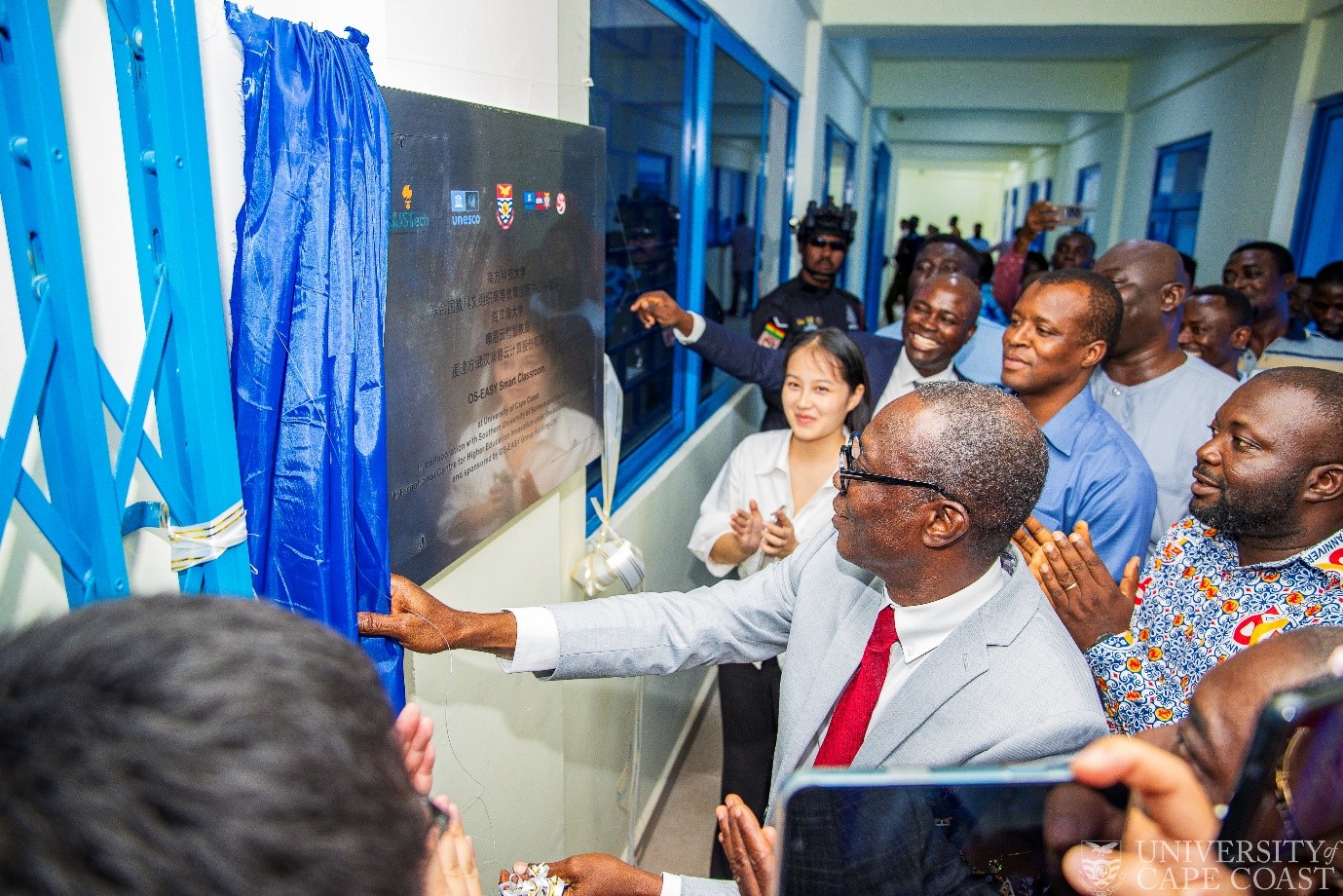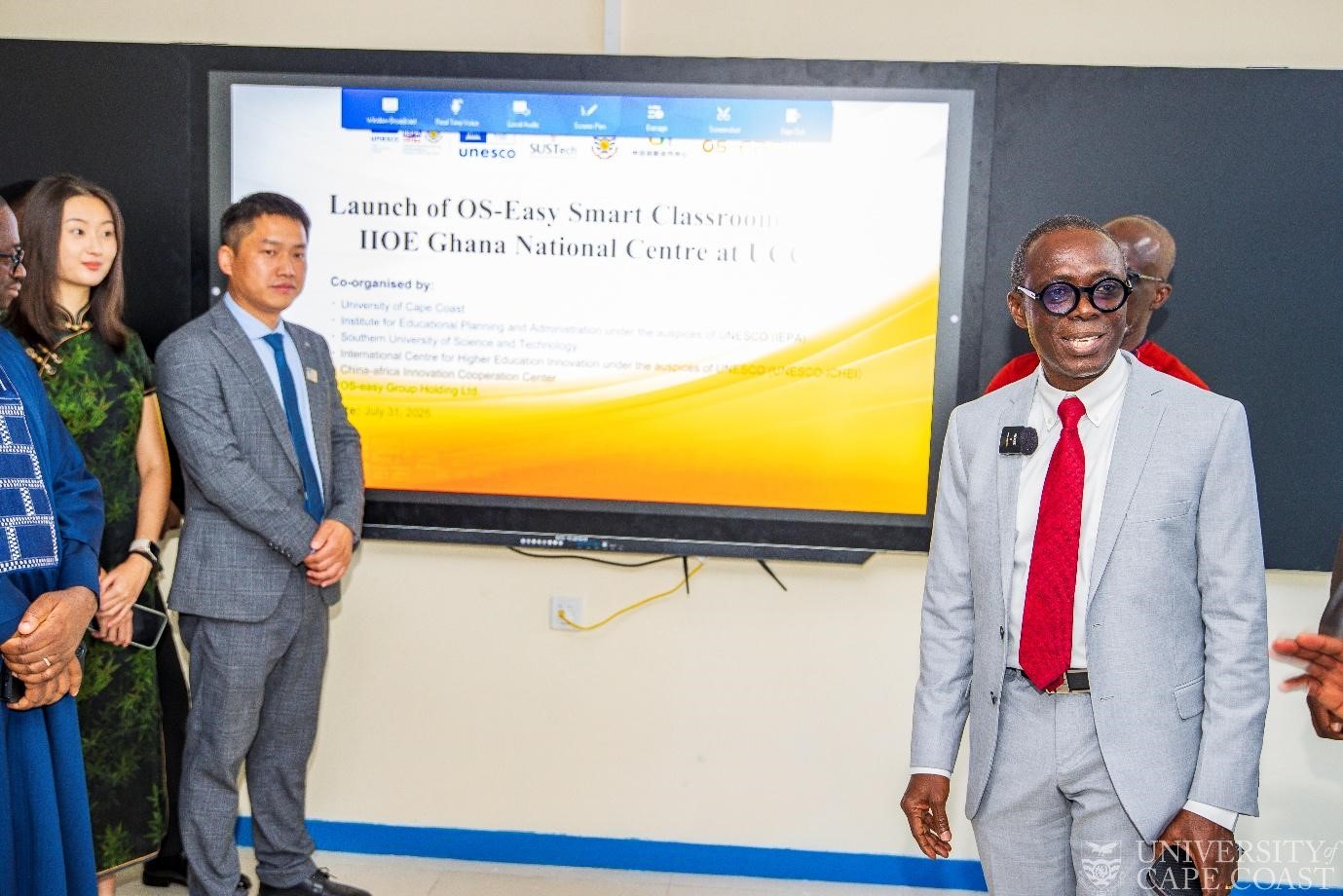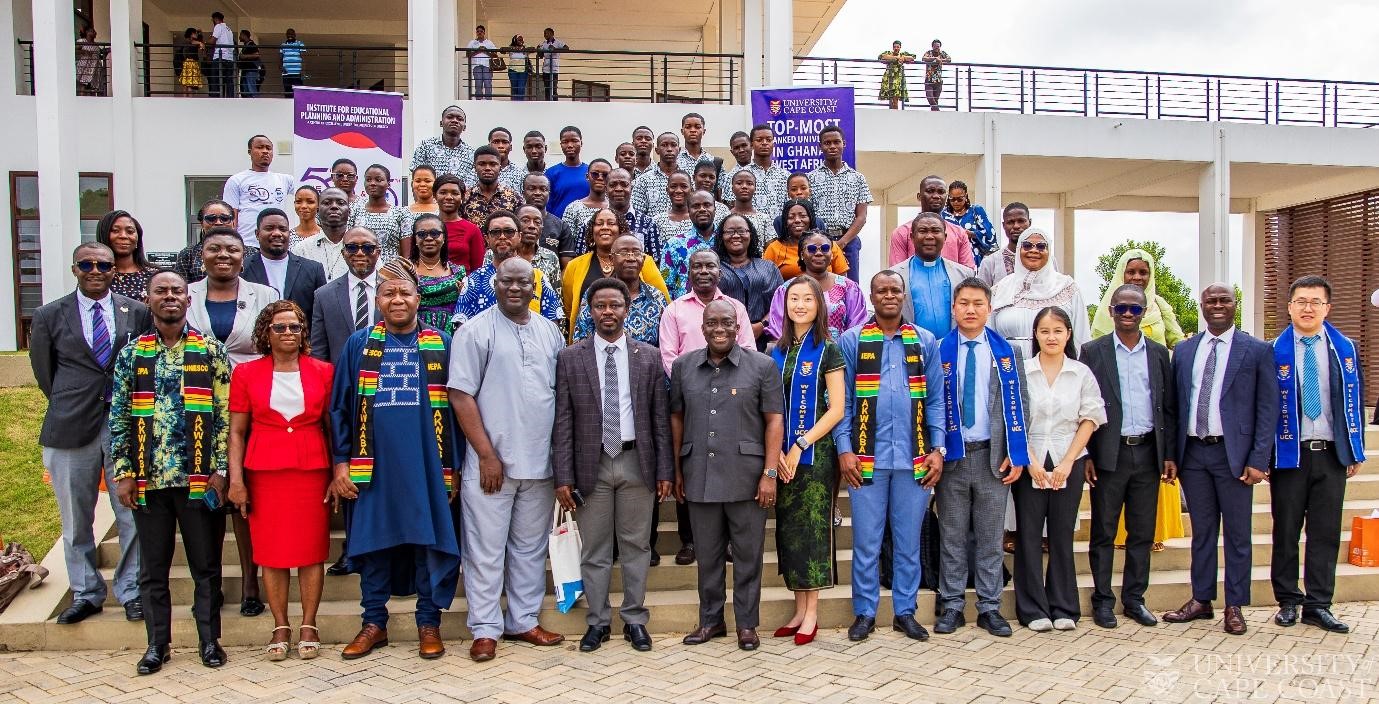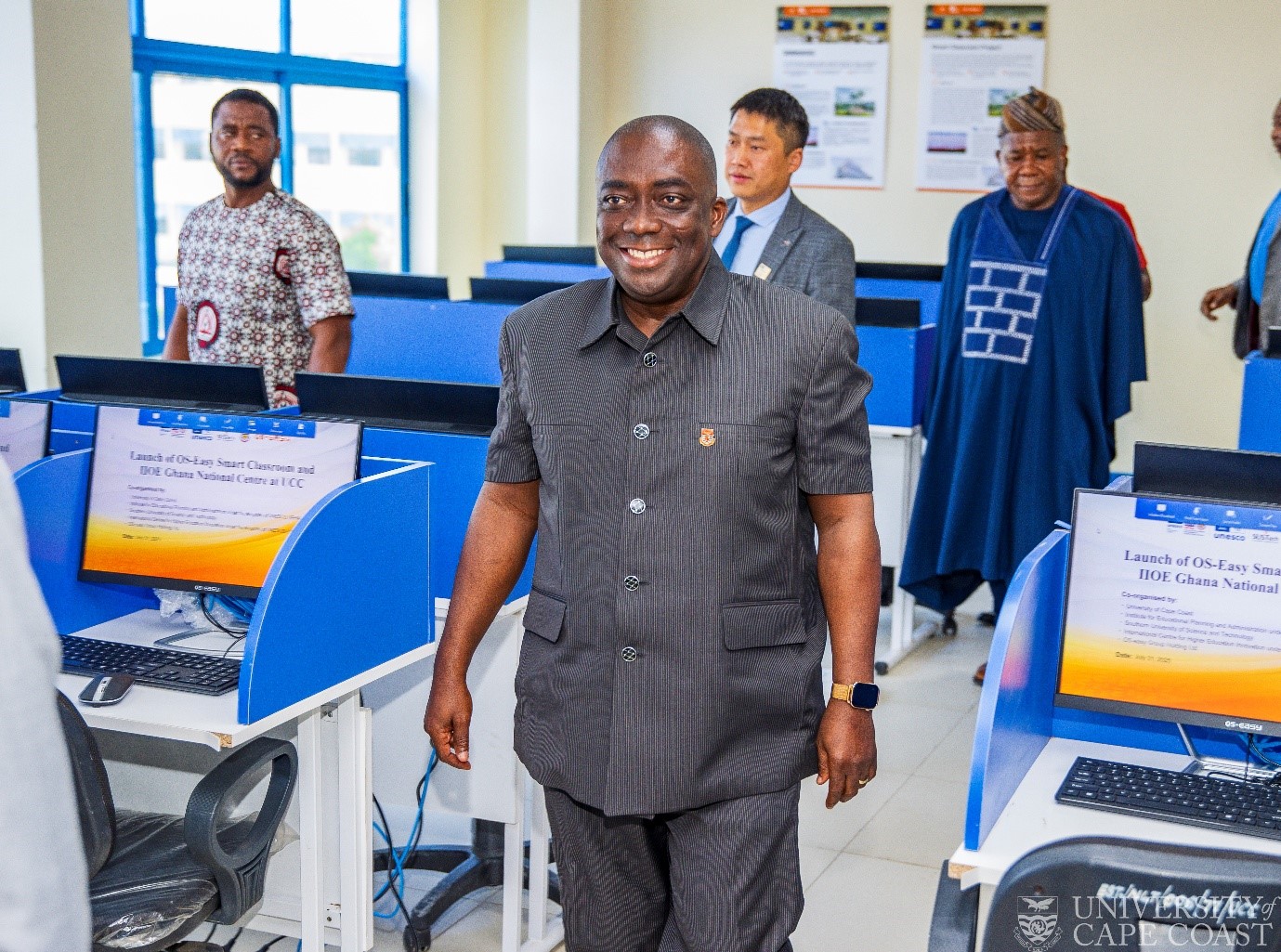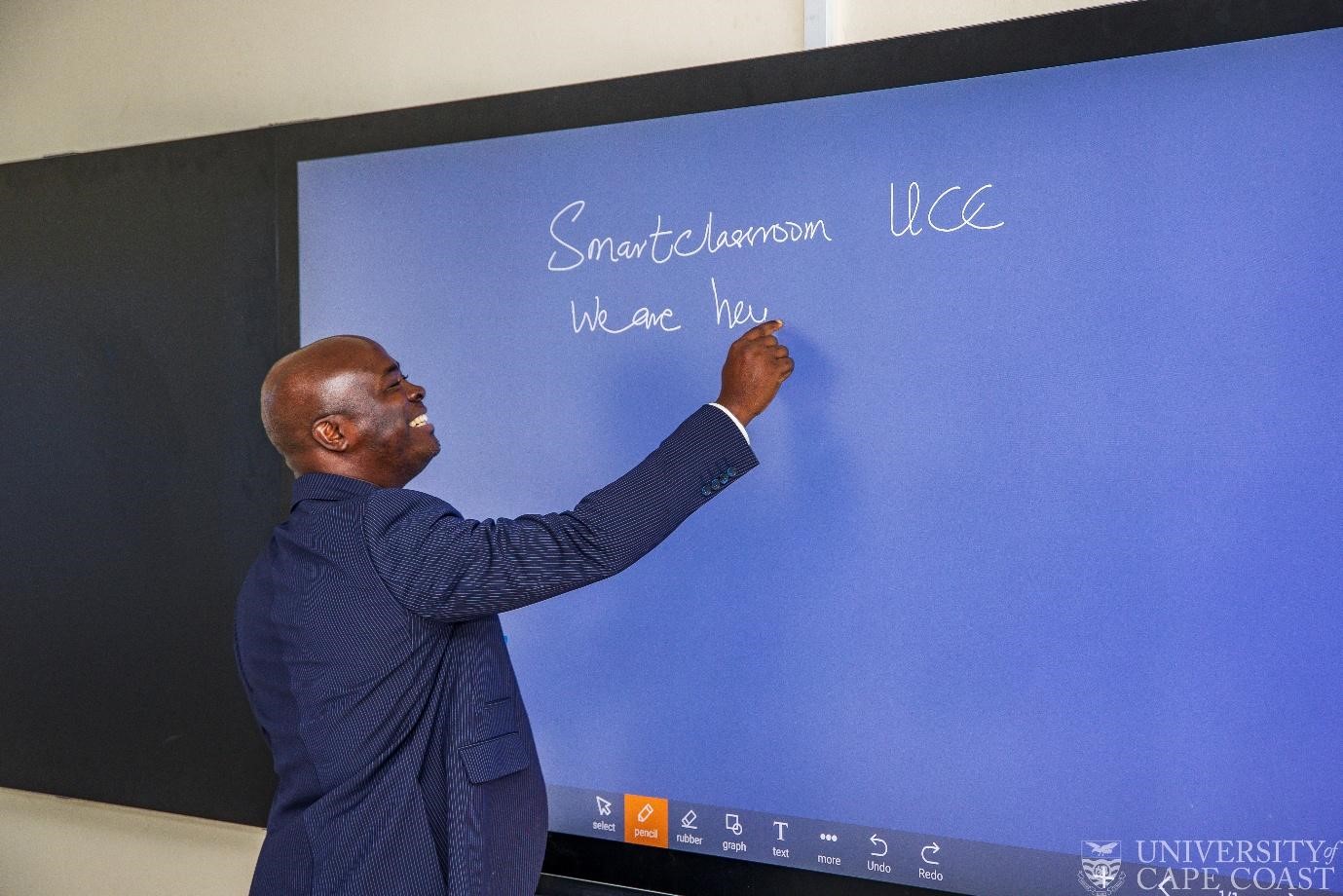A State-of-the-Art OS-Easy Smart Classroom has been inaugurated at the University of Cape Coast (UCC) to enhance teaching and learning through the use of Information Communication Technology.
The University has also been formally designated as the International Institute of Online Education (IIOE) Ghana National Centre. This reinforces UCC’s role as a national hub for teacher professional development and a catalyst for digital transformation in higher education.
These achievements result from a five-party partnership between the International Centre for Higher Education Innovation under the auspices of UNESCO (UNESCO-ICHEI), Southern University of Science and Technology (SUSTech) from the People's Republic of China, University of Cape Coast (UCC), Institute for Educational Planning and Administration (IEPA) under the auspices of UNESCO and OS-EASY Group Holding Ltd.
The International Institute of Online Education is a global collaborative initiative to strengthen the teacher competency of Higher Education Institutes (HEIs) in developing countries and improve access to quality higher education resources. Initiated by UNESCO-ICHEI, together with its partner HEIs and Enterprises in Africa and Asia-Pacific countries, IIOE aims to enhance the capacity of partner HEIs.
In the context of the digital transformation of higher education in the country and West Africa, IIOE National Centre at UCC will leverage the networks and resources of IIOE, bridge UNESCO-ICHEI and the higher education community in Ghana, and create a supportive local higher education ecosystem contributing to realising Ghana's national development strategies.
While the Smart Classroom strengthens the University’s infrastructure capacity for delivering high-quality, technology-enhanced instruction, the IIOE Ghana National Centre reflects a broader institutional commitment to leading digital transformation in Ghanaian higher education.
Vice-Chancellor of UCC, Prof. Johnson Nyarko Boampong, addressing the gathering
Inaugurating the OS-Easy Smart Classroom, valued at $ 85,000 and equipped with high-powered all-in-one desktop computers, accessories, smart board, and other robotics equipment, the Vice-Chancellor, Prof. Johnson Nyarko Boampong, said the classroom had been designed to transform the pedagogical landscape.
While hailing UCC's commitment to innovation and excellence, he noted that the smart room would empower lecturers to expand their frontiers, blended- learning, and provide students with an immersive and interactive educational experience.
"It is a direct response to the evolving demands of modern education and a commitment to equipping our graduates with the skills needed for the 21st century," he added.
Prof. Boampong noted that UCC, as the IIOE National Centre, would serve as a hub for coordinating digital transformation initiatives, building the capacity of faculty, and fostering collaborative policy dialogue.
“This Centre will unlock a myriad of opportunities from capacity building for higher education professionals in critical ICT areas like cloud computing, big data, Artificial Intelligence, and 5G, to student scholarship programmes, exchange of information, and collaborative research,” he continued.
Group shot of participants
“Our role as a national hub for teacher professional development is now significantly enhanced, reinforcing our leadership in shaping the future of education in Ghana,” he added.
Speaking at the event, the Director-General of IEPA Prof. Michael Boakye-Yiadom, explained that the smart classroom platform was equipped with some online international programmes and also enabled the School to develop and upload national programmes for use.
With a mandate to serve the West Africa sub-region, Prof Boakye-Yiadom indicated that IEPA underscored the importance of virtual platforms, adding that the smart classroom would promote online learning.
“The world is moving towards a different direction, including AI and online, and we believe that is the way to go,” he said.
“Some of the postgraduate programmes and courses must go online because many of our students are practitioners who may not have the time to stay here for three good months to pursue those programmes,” he said.
For his part, a Senior Lecturer at the Department of Mathematics and Statistics, Dr. Stephen Moore, underscored the need to invest in digital education, indicating that the best way to educate the youth today was by adopting digital tools.
Director-General of IEPA, Prof. Michael Boakye-Yiadom, at the smart classroom
He said that traditional educational systems were strained by demographic pressures and resource constraints, with Ghana still grappling with the effects of the COVID-19 pandemic at various levels of education.
“Digital education promotes inclusive learning, eliminating physical barriers to education for people with disabilities,” he stated.
Dr. Moore, however, emphasised the need to eliminate all barriers to digital education, particularly the lack of internet access in many communities and the high cost of data.
He also sounded the alarm on cyber threats to educational systems and urged the University to prioritise cybersecurity.
The Technical Advisor to the Minister of Education, Prof. George K.T. Oduro, reiterated the ministry’s commitment to promoting educational technologies to enhance learning outcomes and promote equity.
He described the initiative as “very timely and relevant” to the ministry’s agenda, indicating that personalised learning was very critical in promoting creativity and critical thinking.
He entreated IEPA to strengthen the capacity of lecturers to use the facility effectively to the benefit of students, while urging lecturers to create an environment for students to exhibit creativity and critical thinking.
Dr. Stephen Moore at the smart board
The Director of ICHEI, Madam Xiaohon Bi, highlighted the importance of a smart classroom to UCC’s digital infrastructure as it would serve as a practical space to advance teaching and learning, support capacity building for staff and aid innovative pedagogical practices.
“We believe that this facility will empower educators and students alike, serving as a reference for digital transformation across Ghana’s higher education sector,” she added.
Also speaking at the event, UNESCO Representative to Ghana, Mr. Edmund Moukala, threw his weight behind the adoption of digital transformation but insisted that technology must respond to the needs of the people and take them out of poverty.
“As we have this smart school opened, we have to remember that there is no ground-breaking digital transformation if our people are still struggling with basic service needs such as access to potable water, food and health,” he concluded.
Source: Documentation and Information Section-UCC

